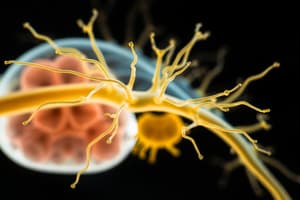Podcast
Questions and Answers
Which two systems work together to coordinate the activities of organs in the body?
Which two systems work together to coordinate the activities of organs in the body?
- Digestive and excretory systems
- Respiratory and circulatory systems
- Neural and endocrine systems (correct)
- Muscular and skeletal systems
The functions of organs in our body do not need to be coordinated to maintain homeostasis.
The functions of organs in our body do not need to be coordinated to maintain homeostasis.
False (B)
What happens to the rate of respiration and heart beat during physical exercises?
What happens to the rate of respiration and heart beat during physical exercises?
They increase to supply more oxygen.
The _____ system provides chemical integration through hormones.
The _____ system provides chemical integration through hormones.
Match the following organs with their functions during physical exercise:
Match the following organs with their functions during physical exercise:
Flashcards are hidden until you start studying
Study Notes
Coordination for Homeostasis
- Organs and organ systems must work together to maintain homeostasis, ensuring stability in the body's internal environment.
- Coordination involves interaction and complementary functions among organs, crucial during activities like physical exercise.
Exercise and Increased Demand
- Physical exertion raises energy demands to support muscle activity.
- Oxygen supply increases due to the heightened need for respiration, impacting heart rate and blood circulation.
- Systems involved include the nervous system, lungs, heart, and kidneys, which adapt during and after physical activity.
Nervous and Endocrine Systems
- The neural system and endocrine system are essential for coordinating organ activities.
- The neural system offers rapid, organized point-to-point communication for quick responses.
- The endocrine system, through hormones, provides slower, but sustained chemical regulation of bodily functions.
Neural Coordination Mechanisms
- Learning about the neural system includes understanding nerve impulse transmission and conduction mechanisms.
- Discusses how impulses are relayed across synapses, vital for communication between neurons.
- Reflex action physiology demonstrates immediate responses to stimuli, illustrating the coordination of organ systems.
Studying That Suits You
Use AI to generate personalized quizzes and flashcards to suit your learning preferences.




